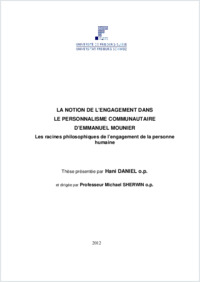La notion de l'engagement dans le personnalisme communautaire d'Emmanuel Mounier : les racines philosophiques de l'engagement de la personne humaine
- Daniel, Hani
- Sherwin, Michael (Degree supervisor)
-
13.12.2012
Thèse de doctorat: Université de Fribourg, 2012
Mounier, Emmanuel
Engagement (philosophie)
Personnalisme
Théologie négative
Événement (philosophie)
Intériorité
English
French
Since Søren Kierkegaard (1813-1855), the notion of commitment has been widely discussed by the philosophies of existence in order to understand man according to the manner in which by he gets involved in the world. Mounier, a Christian existentialist, uses the notion of the commitment as the founding pillar of the authentic existence of the person. Today this approach emerges as an antithesis for men retreat into themselves, on the pretext of the complexity of the world and its political and economic structures. They shun the responsibility for being communicating and the experience difficulty of committing to "duration" as endlessly flowins process. Punctual Commitments are, perhaps, the most common and they come to fruition the seeking of comfort of ultimate life’s meaning at the expense. This causes uneasiness in interpersonal relationships, and contributes to the invasion of individualism that trivializes the community and family relationships. Commitment from the perspective of Mounier’s communitarian personalism, comes about through meditation, a process of progressive liberalization. Therefore, the condition of an exposed life in which others appears as authenticators of a committed life. The person exposes itself through self-negation, by rejecting comfort, and paradoxically, it reveals itself as a gift. Thus, the commitment remains in tension between two requirements: an inspiration towards the absolute (Kierkegaard) and praxis in the materiality of history (Marx). Commitment is establish through constant readjustment at the intersection of interiority and exteriority. Mounier reacts against totalitarian systems such as Marxism, which alienate human existence. Today, posttotalitarianism society and dislocates man, who chooses that which is for aesthetical and exterior, while rejecting the spiritual and interior. The spiritual is repressed in private fantasies (post-Nietzscheism). The cult of the body has replaced its mediating role in the maintaining human values. By means of personalist commitment, Mounier reassesses the status of man as a whole. Thus, commitment proves to be pedagogical and a "rule for a healthy life", where thought and action are constantly in tension with one another, it is a matrix for future solutions. The person’s liberty acquires a new countenance by meeting another’s liberty and it is "conditioned" by it. Thus, liberty is at the root of commitment and it is essential for the liberation of man in his culture.
Depuis Søren Kierkegaard (1813-1855), la notion de l’engagement a été largement abordée par les philosophies de l’existence pour comprendre l’homme par la façon dont il s’implique au monde. Mounier, existentialiste chrétien, fait de l’engagement le pilier fondateur de l’existence authentique de la personne. Cette approche apparaît aujourd'hui comme une antithèse, car, sous prétexte de la complexité du monde, des structures politiques et économiques, les hommes se replient sur eux-mêmes. Ils fuient la responsabilité d’être communicants et éprouvent la difficulté de s’inscrire dans la durée. Des engagements ponctuels sont, peut-être, les plus fréquents et se concrétisent par la recherche du confort, au détriment du sens ultime de la vie. Ceci provoque un malaise dans les rapports interpersonnels et contribue à l'invasion de l'individualisme qui banalise les rapports communautaires et familiaux. L’engagement, dans l’optique du personnalisme communautaire de Mounier, se fait par un recueillement dans un processus de libération progressive. Il est alors la condition d'une vie exposée dans laquelle autrui apparaît comme l’authentificateur de la vie engagée. La personne s’expose dans une négation de soi par rejet du confort et, paradoxalement, elle se révèle comme un don. Ainsi, l’engagement est-il toujours tendu entre deux exigences : une inspiration vers l'absolu (S. Kierkegaard) et une praxis dans la matérialité de l'histoire (K. Marx). L’engagement s’établit dans le croisement de l’intériorité et l’extériorité, dans un réajustement constant. Mounier réagit contre les systèmes totalitaires qui aliènent l’existence humaine. La société d’aujourd'hui, postsystèmes totalitaires, disloque l'homme en optant pour l'esthétique et l'extérieur, tout en évinçant le spirituel et l'intérieur. Le spirituel est refoulé dans les fantasmes intimes (post nietzschéisme). Le culte du corps a remplacé son rôle de médiateur dans l'entretien des valeurs humaines. Par l'engagement personnaliste, Mounier revoit le statut de l’homme entier. Cet engagement apparaît comme une pédagogie et une "règle d'une vie saine" où la pensée et l’action sont constamment mises en tension ; il est une matrice des solutions futures. La liberté de la personne se trace un nouveau visage par celle d’autrui ; elle est "conditionnée" par celle-ci. Ainsi, la liberté est alors à la racine de l’engagement et condition de la libération de l’homme dans sa culture.
- Faculty
- Faculté de théologie
- Language
-
- French
- Classification
- Religion, theology
- Notes
-
- Ressource en ligne consultée le 20.12.2012
- License
- License undefined
- Identifiers
-
- RERO DOC 31268
- URN urn:nbn:ch:rero-002-111436
- RERO R007208762
- Persistent URL
- https://folia.unifr.ch/unifr/documents/302645
Statistics
Document views: 422
File downloads:
- DanielH.pdf: 974
